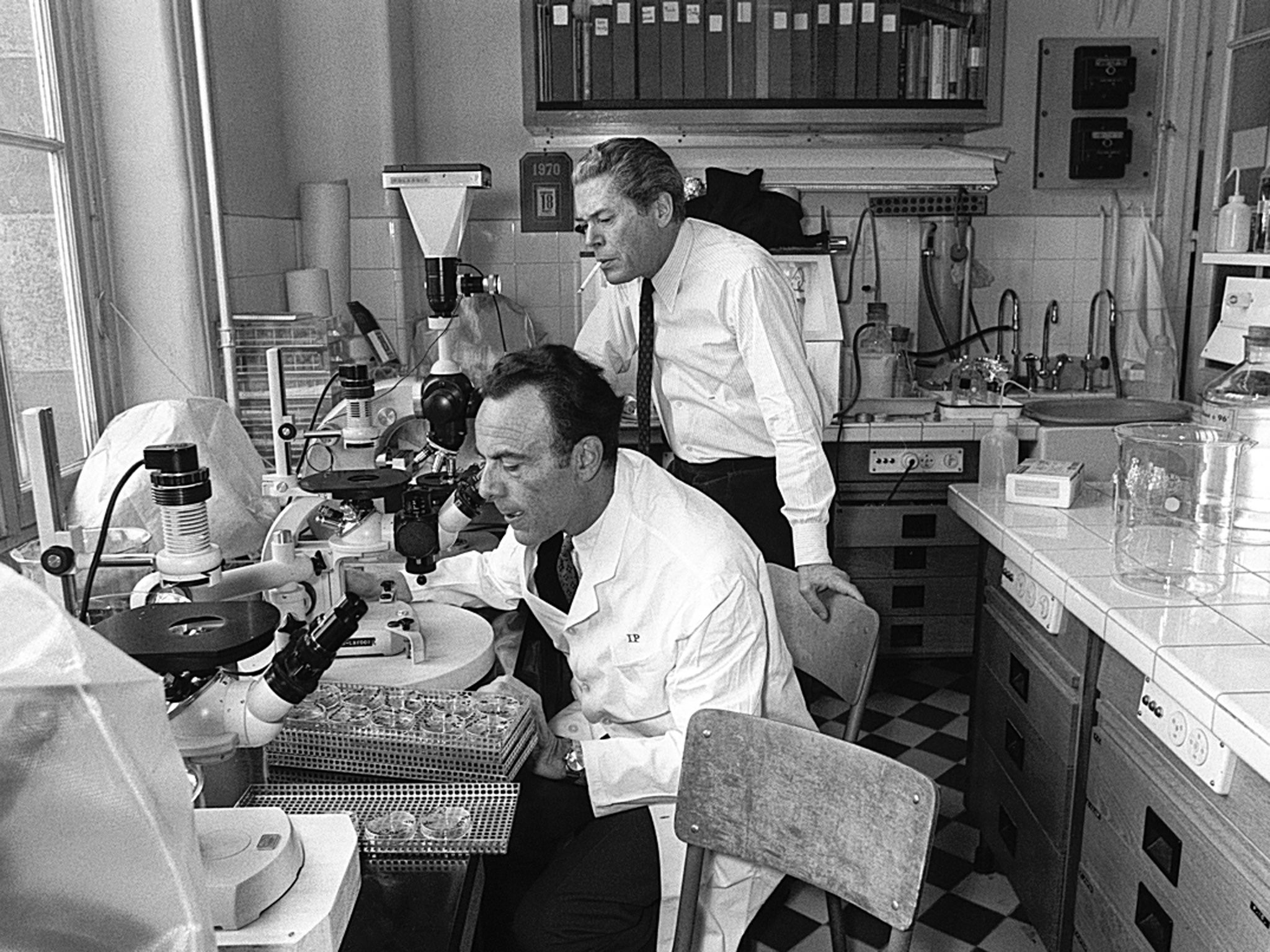François Jacob: Geneticist who helped discover 'the core of life'

François Jacob was not only a decorated French war veteran. He was also considered as one of the fathers of modern biology, and won the 1965 Nobel Prize in Physiology or Medicine for his work with Jacques Monod and André Lwoff on the genetic control of enzymes and virus synthesis.
Working at the Pasteur Institute, Paris, in 1961 the three researchers discovered how, by using DNA and RNA, cells switch "on" and "off" certain genetic information depending on whether it is needed or not – a key aspect of evolution. They studied how the genes were translated to become proteins in the cell, uncovering messenger RNA and regulatory genes that control expression. Their work, which focused on bacteria, improved understanding of how genes could be selectively deployed by an organism. Many considered their discovery to be pivotal to the emerging field of molecular biology, and of transcriptional regulation in particular, offering a new understanding into how people inherit traits, how they grow and develop and how they contract and battle diseases. Jacob was always fascinated by what makes us the way we are; he wanted to discover "the core of life".
Born in Nancy, north-east France, in 1920, he was the only son of Simon Jacob and Thérèse Franck, and the grandson of Albert Franck, "the first French Jew" to reach the rank of general, François wrote in his autobiography. After attending the Lycée Carnot in Paris he studied medicine at the Faculty of Paris, intending to become a surgeon. However when he was 20 the Second World War broke out and, following a radio broadcast by Marshal Pétain advocating collaboration with the Germans, he fled to London, where he was one of the first to join General de Gaulle's Free French Forces.
He served as a battlefield medic in North Africa, where he was wounded, before being posted to the Second Armoured Division, which was involved in the D-Day Landings. He was wounded again in August 1944, this time severely, struck by dozens of pieces of shrapnel, and spent seven months in hospital. After the war he was awarded the Croix de la Libération, France's highest military honour, but as a result of his injuries he was unable to fulfil his surgical ambitions thanks to the damage to his hands.
He quickly finished medical school at the Sorbonne in 1947, from where he earned his doctorate in 1954. Unsure which avenue to pursue, Jacob was encouraged to try research. After he had made several applications to André Lwoff and Jacques Monod for a fellowship at the Pasteur Institute, Lwoff finally agreed and suggested he start work on "the induction of the prophage." Though oblivious to what that meant he accepted the project. He recalled emerging bewildered from his first seminar on lactose induction, but also fascinated. "This was not the cold, studious, stiff, slightly sad, slightly boring world one often imagines," he recalled in his autobiography.
Jacob remained in Lwoff's lab working on phage, a virus that infects and replicates within bacteria, while Monod worked downstairs on bacteria. After Jacob realised that they were, in fact, studying the same thing, transcription repression, they began their Nobel Prize-winning collaboration, uncovering the switch that turns beta-galactosidase synthesis off and on. Their work was spurred on by the publication, in 1953, of James Watson and Francis Crick's ground-breaking work on the double helix structure of DNA for which they were awarded the 1962 Nobel Prize.
Following a series of innovative experiments with bacteria, they established that the transfer of genetic information could be controlled through two different types of genes, regulatory genes and structural genes, the former controlling the expression of the latter. The latter, in turn, not only transmit hereditary characteristics but also serve in the production of enzymes, other proteins, and ribonucleic acid (RNA).
The pair identified messenger RNA which, as the name implies, carries the blueprint for a protein from cellular DNA to the ribosome, where proteins are built. They found that in a normal cell the balance between regulator and structural genes enables the cell to adapt to varying conditions. An interruption in this balance, however, can stimulate the production of new enzymes that can prove either beneficial or destructive to the cell. They also identified the complex system of regulatory genes that turn protein-making genes on and off.
Jacob later extended his research to other fields including how cancer grows and spreads. Jacob's wife, Lise, believed, she wrote, that he had reached "the very essence of things" and had had "a glimpse of how genes work together to make life possible."
Jacob became head of the cellular genetics unit at the Pasteur Institute from 1960 until his retirement in 1991, serving as its president from 1982-88, and was professor of cellular genetics at the College of France from 1965-92. An honorary member of scientific academies round the world, he was elected as a foreign member of the American Academy of Arts and Sciences in 1964, the National Academy of Sciences of the US in 1969 and the Royal Society in 1973. He was also a sought-after guest speaker. As well as more than 200 scientific papers he wrote The Logic of Life: A History of Heredity (1970), The Possible and the Actual (1981) and An Autobiography: The Statue Within (1987).
Jacob is survived by his second wife Geneviève Barrier and his four children from his first marriage with the pianist Lise Bloch, who died in 1983.
François Jacob, geneticist: born Nancy 17 June 1920; married Lise Bloch (died 1983; three sons, one daughter), 1999 Geneviève Barrier; died Paris 19 April 2013.
Subscribe to Independent Premium to bookmark this article
Want to bookmark your favourite articles and stories to read or reference later? Start your Independent Premium subscription today.

Join our commenting forum
Join thought-provoking conversations, follow other Independent readers and see their replies